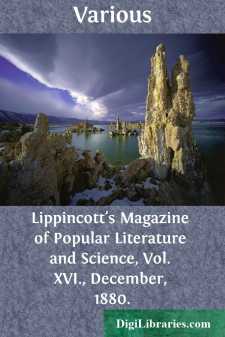Categories
- Antiques & Collectibles 13
- Architecture 36
- Art 48
- Bibles 22
- Biography & Autobiography 813
- Body, Mind & Spirit 142
- Business & Economics 28
- Children's Books 15
- Children's Fiction 12
- Computers 4
- Cooking 94
- Crafts & Hobbies 4
- Drama 346
- Education 46
- Family & Relationships 57
- Fiction 11829
- Games 19
- Gardening 17
- Health & Fitness 34
- History 1377
- House & Home 1
- Humor 147
- Juvenile Fiction 1873
- Juvenile Nonfiction 202
- Language Arts & Disciplines 88
- Law 16
- Literary Collections 686
- Literary Criticism 179
- Mathematics 13
- Medical 41
- Music 40
- Nature 179
- Non-Classifiable 1768
- Performing Arts 7
- Periodicals 1453
- Philosophy 64
- Photography 2
- Poetry 896
- Political Science 203
- Psychology 42
- Reference 154
- Religion 513
- Science 126
- Self-Help 84
- Social Science 81
- Sports & Recreation 34
- Study Aids 3
- Technology & Engineering 59
- Transportation 23
- Travel 463
- True Crime 29
Lippincott's Magazine of Popular Literature and Science, Vol. XVI., December, 1880.
by: Various
Description:
Excerpt
AN HISTORICAL ROCKY-MOUNTAIN OUTPOST.
GOING TO THE JUDGE'S.
The day might have graced the month of June, so balmy was the air, so warmly shone the sun from a cloudless sky. But the snow-covered mountain-range whose base we were skirting, the leafless cottonwoods fringing the Fontaine qui Bouille and the sombre plains that stretched away to the eastern horizon told a different story. It was on one of those days elsewhere so rare, but so common in Colorado, when a summer sky smiles upon a wintry landscape, that we entered a town in whose history are to be found greater contrasts than even those afforded by earth and sky. Today Pueblo is a thriving and aggressive city, peopled with its quota of that great pioneer army which is carrying civilization over the length and breadth of our land. Three hundred and forty years ago, as legend hath it, Coronado here stopped his northward march, and on the spot where Pueblo now stands established the farthermost outpost of New Spain.
The average traveller who journeys westward from the Missouri River imagines that he is coming to a new country. "The New West" is a favorite term with the agents of land—companies and the writers of alluring railway-guides. These enterprising advocates sometimes indulge in flights of rhetoric that scorn the trammels of grammar and dictionary. Witness the following impassioned utterances concerning the lands of a certain Western railroad: "They comprise a section of country whose possibilities are simply infinitesimal, and whose developments will be revealed in glorious realization through the horoscope of the near future." This verbal architect builded wiser than he knew, for what more fitting word could the imagination suggest wherewith to crown the possibilities of alkali wastes and barren, sun-scorched plains?
A considerable part of the New West of to-day was explored by the Spaniards more than three centuries ago. Before the English had landed at Plymouth Rock or made a settlement at Jamestown they had penetrated to the Rocky Mountains and given to peak and river their characteristic names. Southern Colorado, New Mexico and Arizona have been the theatres wherein were enacted deeds of daring and bravery perhaps unsurpassed by any people and any age; and that, too, centuries before they became a part of our American Union. The whole country is strewn over with the ruins of a civilization in comparison with which our own of to-day seems feeble. And he who journeys across the Plains till he reaches the Sangre del Cristo Mountains or the blue Sierra Mojadas enters a land made famous by the exploits of Coronado, De Vaca and perhaps of the great Montezuma himself.
In the year 1540, Francisco Vasquez de Coronado was sent by the Spanish viceroy of Mexico to explore the regions to the north. Those mountain-peaks, dim and shadowy in the distance and seeming to recede as they were approached, had ever been an alluring sight to the gold-seeking Spaniards. But the coveted treasure did not reveal itself to their cursory search; and though they doubtless pushed as far north as the Arkansas River, they returned to the capital from what they considered an unsuccessful expedition....












